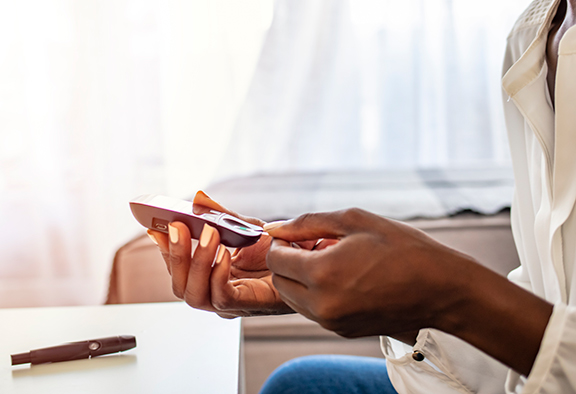September 15, 2021
Insulin Shock Treatment | Type 1 Diabetes Management
If you have diabetes, you already understand the crucial role insulin plays in the human body. Learn more about insulin shock, hypoglycemia, and its treatments.
Share This Story

Insulin therapy is an integral part of a diabetes treatment regimen for many people. However, it’s entirely possible to have too much of a good thing. That goes for insulin, too. Excess levels of insulin in your bloodstream can lead to insulin shock or hypoglycemia.
If you ignore insulin shock for long enough, it can progress from a mild inconvenience to a life-threatening emergency. Because of that, you’ll need to know what symptoms to keep an eye out for and how to treat them quickly. In this article, we’ll take a closer look at the telltale signs of hypoglycemia – and how you can deal with this condition.
What is Hypoglycemia?
If you have diabetes, you already understand the crucial role insulin plays in the human body. Depending on your diabetes diagnosis, you may have trouble producing or responding to insulin. But while many of the challenges associated with diabetes have ties to these factors, insulin shock is different – it is related to unusually high levels of insulin in a person’s bloodstream.
“Hypoglycemia” is a term referring to low blood sugar levels. While avoiding and treating overly high blood sugar levels is a crucial part of diabetes management, dealing with hypoglycemia is just as necessary. If you’re experiencing minor hypoglycemia but don’t take steps to manage it, it could become much more dangerous.

What Causes Hypoglycemia?
Technically speaking, hypoglycemia and insulin shock are not the same things. Instead, hypoglycemia is the body’s reaction to excess insulin in the bloodstream. While insulin typically helps glucose enter cells, the lower levels of blood sugar associated with hypoglycemia mean there isn’t enough glucose to go around. Without sufficient amounts of glucose to fuel cells, the body can enter a state of shutdown known as “insulin shock.”
For people with diabetes, insulin injections may lead to hypoglycemia and insulin shock. If you don’t eat after injecting insulin or inject too much insulin, you may end up dealing with these problems. These aren’t the only causes of hypoglycemia, however. You may also encounter this condition if you drink alcohol without eating enough at the same time, working out more than average, or simply not getting enough food.
Are There Symptoms of Hypoglycemia or Warning Signs of Insulin Shock?
The symptoms associated with hypoglycemia and insulin shock vary based on how far the situation has progressed. In the early stages of hypoglycemia, some relatively minor warning signs can indicate low blood sugar, including:
- Hunger
- Shaking and sweating
- Emotional changes (anxiety, irritability, etc.)
- Dizziness
- Fast heartbeat
If you don’t take action to deal with these symptoms, your blood sugar may continue to fall. That can result in more dangerous symptoms, such as:
- Headache
- Uncoordinated and confused behavior
- Seizures
- Coma
Finally, hypoglycemia can affect you in your sleep. There are several symptoms related to sugar crashes during the night:
- Nightmares
- Sweating (possibly resulting in damp pajamas/bedsheets)
- Crying out while asleep
- Confusion, tiredness, or irritability upon awakening
How Is Hypoglycemia Treated?
In many cases, you can deal with mild to moderate hypoglycemia quickly. If your blood sugar is below 80, all you need to do is consume 15g of a fast-acting carbohydrate in the form of glucose tablets, food, or drink.
To reach this amount, you can eat or drink one of the following 15g fast-acting carbohydrates:
- Three or four glucose tablets
- A half-cup of fruit juice or (non-diet) soda
- A tablespoon of sugar or honey
- 5-6 jelly beans
Once you’ve done this, wait 15 minutes and recheck your blood sugar. If it’s still low, go through the process until you are once again in range. Then, eat another small snack if you’re not planning to have a meal in the next hour or so to help stabilize your sugar.
If your blood sugar is 50 or below, you must treat with 30g of one of the fast-acting carbs.
Wait 15 minutes and check your sugar. If it is still low, repeat. If it continues to be low after another 15 minutes then call your healthcare provider or emergency service.
After you have corrected your low blood sugar, it is important to eat a snack containing a carbohydrate, a protein, and a fat to stabilize it i.e., peanut butter crackers.
Severe hypoglycemia, including insulin shock leading to loss of consciousness, may require more involved treatment. If you believe you are dealing with insulin shock, you or someone else should call 911 and follow the treatment steps listed above. If you have lost consciousness, someone should give you a glucagon injection (if they have access to glucagon).
Along with this, there are various steps you can take to lower your risk of falling victim to hypoglycemia. These steps include making sure to eat after an insulin injection, being careful while drinking alcoholic beverages, being aware of the impacts exercise can have on blood sugar, and checking your blood sugar regularly.
Let Us Help You Avoid Insulin Shock
Hypoglycemia and insulin shock are annoying at best and potentially deadly at worst. With the knowledge shared in this article, we hope you can more effectively treat and prevent these conditions.
US MED sells a wide variety of products for people with diabetes, including some products that can keep your blood sugar in range. Our CGM systems and traditional blood glucose meters can make it easier to check your glucose levels. Furthermore, our insulin pumps and insulin pens can deliver accurate doses of insulin. No matter what you order, you will appreciate our automatic reorder reminders and free shipping!







